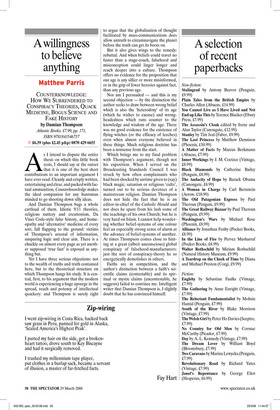A willingness to believe anything
Matthew Parris
COUNTERKNOWLEDGE: HOW WE SURRENDERED TO CONSPIRACY THEORIES, QUACK MEDICINE, BOGUS SCIENCE AND FAKE HISTORY by Damian Thompson Atlantic Books, £7.99, pp. 171, ISBN 9781843546757 ✆ £6.39 (plus £2.45 p&p) 0870 429 6655 As I intend to dispute the entire thesis on which this little book rests, I should say at the outset that it is one of the best short contributions to an important argument I have ever read. Cleanly and crisply written, entertaining and clear, and packed with factual ammunition, Counterknowledge makes the ideal companion for any huntsman minded to go shooting down silly ideas.
And Damian Thompson bags a whole cartload of them. Idiotic 9/11 theories, religious nuttery and creationism, Da Vinci Code-style false history, and homeopathy and ‘alternative’ medicine of every sort, fall flapping to the ground: victims of Thompson’s arsenal of information, unsparing logic and clear aim. There is a chuckle on almost every page as yet another supposed ‘true fact’ is exposed as anything but.
Yet I have three serious objections: not to the wealth of truths and truth contained here, but to the theoretical structure on which Thompson hangs his study. It is central, first, to his argument that the modern world is experiencing a huge upsurge in the spread, reach and potency of intellectual quackery: and Thompson is surely right to argue that the globalisation of thought facilitated by mass-communications does allow untruth to circumnavigate the planet before the truth can get its boots on.
But it also gives wings to the remedy: rebuttal. And when beliefs could travel no faster than a stage-coach, falsehood and misconception could linger longer and reach deeper into a culture. Thompson offers no evidence for the proposition that our age is any sillier or more misinformed, or in the grip of fewer heresies against fact, than any previous age.
Nor am I persuaded — and this is my second objection — by the distinction the author seeks to draw between wrong belief which is also the ‘heterodoxy’ of its age (which he wishes to excuse) and wrongheadedness which runs counter to the knowledge and wisdom of the age. There was no good evidence for the existence of flying witches (or the efficacy of leeches) even when almost everyone believed in these things. Much religious doctrine has been a nonsense from the start.
Which brings me to my final problem with Thompson’s argument, though not his exposition. When I served on the Broadcasting Standards Council I was struck by how often complainants who had been shocked by airtime given to (say) black magic, satanism or religious ‘cults’, turned out to be serious devotees of a mainstream religion. Damian Thompson does not hide the fact that he is an editor-in-chief of the Catholic Herald and nor does he spare from his lash some of the teachings of his own Church; but he is very hard on Islam. I cannot help wondering whether belief-systems of one colour feel an especially strong sense of alarm at the advance of belief-systems of another. At times Thompson comes close to hinting at a great (albeit unconscious) global conspiracy of falsehood-manufacturers: just the sort of conspiracy-theory he so energetically demolishes in others.
Faiths are in competition, and the author’s distinction between a faith’s scientific claims (contestable) and its spiritual or mystic claims (uncontestable, he suggests) failed to convince me. Intelligent writer that Damian Thompson is, I slightly doubt that he has convinced himself.
















































































 Previous page
Previous page